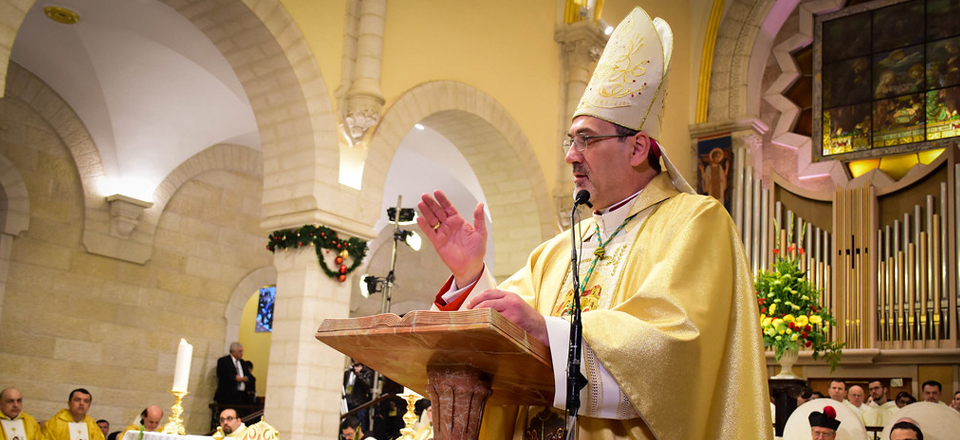Apostolic Administrator of the Latin Patriarchate
“The shepherds said to each other: «Let us go therefore to Bethlehem, let us see this event that the Lord has made known to us». They went without delay and found Mary and Joseph and the child, lying in the manger” (Lk 2:15-16).
The Christmas Gospels, like those of Easter, are replete with verbs of motion. The birth of Jesus, His coming to us has, in fact, aroused a sort of domino effect: Mary and Joseph, the angels, the shepherds, the Magi … all are in motion, they move from one place to another. All on account of or because of the apparently normal birth of any child in the Bethlehem of that time.
The shepherds, knowing what the Lord announced to them through the angels, had to move. “Let us, therefore, go as far as Bethlehem” … Only thus could they see and finally know, that is, experience what had been announced to them by the angels.
The invitation is also addressed to us today. Go and see, to know.
“This is the sign for you: you will find a child wrapped in swaddling clothes, lying in a manger” (Lk 2:12). What does the sign of Bethlehem show us? If this question were addressed to our ecclesial community, what and how should we respond? What have we seen and known in the year that is now over and what can we expect in the coming year?
If we had to look for hope only within our small human affairs, we would have very little to do.
We must deal with the fragility of political life, perceived increasingly distant from the real life of the population and apparently unable to deal systematically with the enormous social and economic problems of our region. In this context, it is difficult to see how it is possible to give even the slightest prospects for the Israeli-Palestinian question, which weighs down the life of a large part of our community. We see so many solution proposals flying over our heads, but we never see them land and lead to something concrete. The arrival of more and more pilgrims from all over the world brings smiles to many families, who can thus work with serenity. Despite this, in most of the territory of our diocese, work remains the main problem for many of our families. We are also witnessing the worsening of the living conditions of many foreign and immigrant workers. The idea of emigrating becomes a temptation, a persistent thought in many of us. I could go on and on with this litany of difficulties. In short, everything seems to tell us that talking about hope is simple rhetoric, an estrangement from the true reality of our land.
Let us remember, then, that the times of Jesus were no better than ours. There was the Roman occupation, there was Herod, there were various centers of power. All in all, man does not seem to have changed much since then.
But woe to those who give up! That is not the message of Christmas. The birth of Jesus has not erased any of the political, social and economic dramas of his time. Jesus did not come to revolutionize the social structures of his time, he did not want to conquer power, but the heart of man. That’s how the world changed.
My thoughts and my thanks, then, are addressed to the many and to the many who with love, in silence, and without clamor, still today give their lives and their hearts for free.
To the parents who, despite the many difficulties, had the courage to look to the future and give hope to their children. To the many operators and volunteers who spend themselves in hospitals, homes for the elderly, and homes for the disabled. To our young people who do not give up dreaming of a better future. To those who work for justice and the dignity of all. To our priests, men, and women religious who, despite the sometimes solitude and misunderstanding, continue to give their lives for their communities. In short, to those who have understood that being a Christian means giving life, loving free, without waiting for anything for themselves, because they already have everything. They are people who have in their hearts a great hope, a sincere and profound desire that takes them outside of themselves and is attentive to others. Only with such a hope, what the Holy Spirit has put into us, will we really succeed in changing the world.
Having visited most of our parish and religious communities, I must say that even today and despite all our limitations, this still happens. Among our many contradictions, in fact, I met everywhere happy people, dedicated with constancy to the service of their family, their community, their reality of life.
They are the hope of our Church. In them, true Christmas is still celebrated.
May their example and their lives continue to change the hearts of so many. I am sure that this is the only way we can truly make our tormented Holy Land happy.
Merry Christmas and Happy New Year!
+Pierbattista
Source: Latin Patriarchate of Jerusalem






